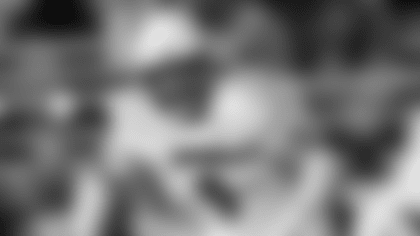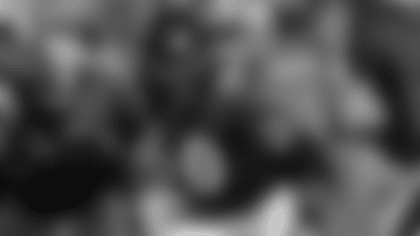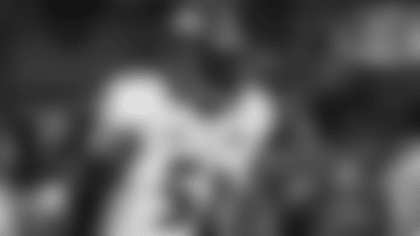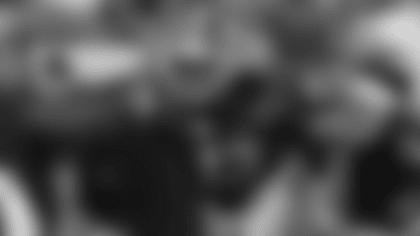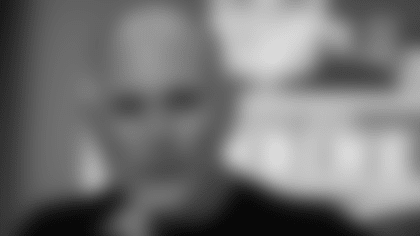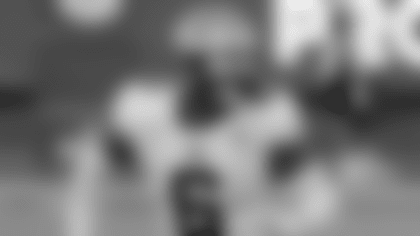RING OF HONOR INDUCTEE MATT STOVER
Matt, when it comes to being a kicker, you have to block out 70,000 fans. Now, you have to step to a microphone and acknowledge them and talk right to them. You've had a few months to figure out what you're going to say… (Joe Platania) "Yeah, it's just a privilege to be able to be part of the Ring of Honor with the other six recipients. I can't say enough about the community of Baltimore, and how they embraced the team back in '96. Remember, I was part of that. Just for me to be up there, everybody else is going to be up there with me. It's not just Matt Stover. I don't take full credit. There are a lot of people in my Ravens' family who played with me, who assisted the team, all these people all played a huge part in what happened with my career and why the success came about. The fact that it was bigger than just the game, it was bigger than just kicking for me. It was always about the other guy, helping the other person to be the best they could be; not only on the field, but off the field. That's really what my main mission was."
Matt, you talked about coming over with the team from Cleveland. What was that like, going through that process and then being here, from Cleveland, now being with the team and lasting as long as you did here in Baltimore? (Garrett Downing) "1996, I don't mind telling you, was hard. Leaving a community that I had just purchased a home [in], signed a new contract, [and] didn't know what was going on. And next thing you know, in October, we were moving to Baltimore. In that case, you are questioning what is going on and what is [former Ravens owner and current minority owner] Art Modell doing. Then we got here, and I started preseason in Memorial Stadium. Remember, we got here in April, we didn't even have a name, we didn't have colors; we didn't have anything. We wore black helmets, white shirts, jerseys. We don't know anything. We didn't even have sweatpants, and it was freezing out there in minicamps. Memorial Stadium was packed. Then I saw the tradition that this city had missed for 14 years, and how they deserved and were honored by getting a team. We owe Art Modell and his family a tremendous debt for that. Now that Steve Bisciotti owns the team, things have gotten even better. How they have empowered this city to be what they should have always been, and that is a main mark in the NFL. As you see, this team has been a great success."
Matt, you'll be inducted while the Ravens play the Bengals, a team that you scored your most points against than any opponent. How does that feel? (Aaron Wilson) "[Bengals head coach] Marvin [Lewis] and I are friends, but sorry, Marvin, I had to pick on your team a little bit when we were kicking field goals. I wish I could say that I had all to do with that, with kicking the field goals and saying, 'Let's kick it.' But, it shows a lot about our offense and the trust that they had in me and the team, and the ability to continue to kick against a team like I did. I actually kicked against them for 18 seasons, and that's a lot of field goals against one team. I could say that about the Steelers, [too]. I played, I think, 22 times or 21 times in Pittsburgh. So, more than a season in an opponent's stadium, as well as in Cincinnati. When you look at those things, the opportunity to kick against them, a few game-winners… [Former Bengals head coach] Sam Wyche, I will never forget in 1991, sent me a letter back. I had just kicked a 45-yard game-winning field. It was my first year kicking, and he wrote a note. I still have it framed. It's in my office. He says, 'I always respect a great play.' I will never forget that and just, 'Wow.' Here is a head coach in the NFL sending something like that to me, and it was really flattering."
Matt, it's not often that a kicker becomes a fan favorite in a city, like you did here. What was your take on that while you were playing here and after you retired, and how do you view that now? (Ryan Mink) "I hope that it started off the field, more than on the field. That's really where it was for me – that's really where my heart was, even though I gave everything I could to be the best I could on the field. I embraced the community immediately, began an outreach where my faith is there, and then I was able to help out kids, and fathers, and churches, and schools. I reached out to them because I knew that the platform that I had been privileged with was where it needed to be. I just invested back in the community that was investing in me. Of course, you have to perform – flat out. You have to kick the field goals; you have to hit the big ones and kicking the team into the Super Bowl… A lot of field goals happened that year, 16-consecutive field goals without any other points on the board, one extra point, that's 49-consecutive points, and then we were winning a few of those games. It was very critical for that team, and when you win a Super Bowl, and you are able to have a great effect like that as one of the players, even though you are a 'kicker,' it does help. That's what I see would happen."
What was it about this community? You played here so long, but you have remained here. Players often come and go when they are finished with their NFL playing career, but you remained completely invested in this community. (Luke Jones) "The adage is that the grass isn't always greener on the other side. I maintained a career for 20 total seasons. When you go back and look at that, 18 of those years with one [franchise], tells you that you have to perform. The other thing is that [general manager and executive vice president] Ozzie Newsome, his staff, as well as the coaching staffs we had here, had trusted me. It came down to trust and we had a relationship. Even my last contract was all makeable money. I didn't go off the charts with the cash and making sure that that's not what this whole thing was about. Sure, I wanted to empower my family, like anybody would, but that wasn't my central focus. My central focus was, first of all, to serve and to be the best I could be on the field. That's how I look at it, and I think with that mindset … And when it was time in 2008 to step away, and the Ravens were choosing, and I was choosing to go different directions, and then I ended up with another team, and we ended up getting into the Super Bowl; there is no regret. I always wanted to share that. I appreciated the opportunity that I had to play here. It was a privilege to play. It was never something that I thought I deserved. I think with that mindset, it allowed me to step away from the game and say, 'Hey, that was fun. Let's enjoy that.'"
Matt, few kickers have been of your stature, as far as reliability. Guys of your kicking generation like Morten Andersen, Gary Anderson and [Adam] Vinatieri. Why has kicking in the NFL been such a troublesome spot for teams? Why can't they find that automatic guy? (Mark Zinno) "It's the experience factor behind it. You look at some of the premier kickers that are out there, most of them have had five or six years of learning. The young guys are very difficult. When you look at the overall course of a kicker's career, you typically see the first couple of years [are] a little difficult, or if not, he has a dip somewhere. It's the guys who are able to maintain a nine, 10-year consistent-type of pedigree where they actually kick well for that amount of time is really what qualifies that. So, it takes some time. It took me about six years into the League to be considered one of the better kickers in the League. It took another 10 years to take you to a whole another level. It's really the amount of time that it takes."
How old were you when you first kicked a football, and what attracted you to it? (Mark Suchy) "I was 11-years-old when I actually was in a competitive environment. I was a Punt, Pass and Kick champion in Dallas. I played for the YMCA team called the Dallas Cowboys. I grew up in Dallas and [former NFL coach] Dan Reeves was my coach, believe it or not. He was one of the coaches. His son Lee and I lived just a couple of streets from one another. Lee and I, and Dan and I, just loved to kick. I was one of those kids that got a bag of balls and kicked at the high school or elementary school, and I kicked across the street. I ended up winning the competition all the way to the semi-finals. I shanked my punt. That's why I don't punt. (laughter) I shanked it and I lost the competition by five feet, even though I shanked it, because I threw the ball and kicked off better than the other guy. But, I lost. It lit the fire in me though. There was a failure, but my father said, 'You know what, Matt? Everybody fails in life. It's what you do with that failure is what's going to make you into that person you want to be.' So, I picked it up, put the fire underneath me, and I kept kicking, kept kicking. Louisiana Tech took a chance on me and next thing you know I get drafted by the New York Giants. It was a great ride."
What do you expect it to be like on Sunday, and when was the first time the Ring of Honor entered your mind? (Ryan Mink) "The first time it ever entered my mind was after the season of 2009 when I was at the Colts. I wanted to sit down with Steve Bisciotti and say, 'Hey, Mr. Bisciotti. I would like to explain to you what happened, making sure you and I are on the same page.' He kind of understood the situation prior to me even speaking with him, but I just wanted sit down, man-to-man, because I respect him so much, to say, 'Look, here's what happened.' Right after that, he says, 'You know Matt, your name is going in that Ring of Honor.' I went, 'Wow. Are you kidding me? You want that for me? Unbelievable.' That was the first time it entered my mind, was actually when Mr. Bisciotti said something about it."
Matt, we were out at practice just now, and it struck me that you were going to be here. And it's 48 degrees, and it's chilly, and it's breezy, and I think all but 25 of your field goals were outdoors. What does that say? (Joe Platania) "Well, I appreciate you bringing that up. There are a couple things I'm proud of with regards to statistics, and the No. 1 is that I never missed a game. You look at kickers in the NFL who have played 10 or more years, and every one of them missed time. I don't know a guy that hasn't. I never missed a game. I got a 'Did Not Play' for not actually touching the field, because we played the Tampa Bay Buccaneers – they were the Super Bowl champions that year – but I had a kickoff guy. And my kickoff guy – I think it was Wade Richey, I can't remember – he kicked off, and then we didn't score a point, and I didn't get a field goal attempt or nothing. It was like, 'Oh, man.' I thought it was great; I got paid for doing nothing, right? (laughter) And low and behold, I ended up getting a 'Did Not Play,' so I would have had a consistent 19-year string of games played. And then the second this is that… The first one is that I never missed a game, and, what was your question? I'm trying to think… (Reporter: "About the weather conditions…") Conditions, yeah. I only had 25 field goals in a dome, and the fact that I was able to go in our division, in Pittsburgh, in Cincinnati, in Cleveland… Played in Cleveland for five years, played here – even though Baltimore isn't as bad as Cleveland and Pittsburgh – we have a lot of rain, a lot of wind, and it gets windy in that stadium. I don't mind to tell you. So, those two things are really, really what drove the ship for me with regards to statistics."
Matt, can you talk about some of your more memorable kicks? Do you have a favorite? (Mark Zinno) "Well, my favorite is the 2008 kick, when we kicked the Ravens in from the Divisional Playoff game in Tennessee into the AFC Championship game. That, with regards to getting us in position to move closer to our ultimate goal – which was a Super Bowl – that was the most memorable kick. The second one is in the Super Bowl, when our defense was telling our offense, 'Hey, guys, you get 10 [points], you win.' 'And what do you mean by 10?' They said, 'You get 10 points, you'll win.' And so, I knew that included me; a touchdown and a field goal. (laughter) So, I just went, 'Oh, great. OK, so where's that three going to come? At the beginning or at the end?' And when Brandon Stokley scored a touchdown, as we all recall, we had seven. And we're driving, right about three minutes left in the first half, and with one minute, 52 seconds left, I'm out there kicking a 47-yarder. And immediately, I'm walking right out on the field [saying], 'If we get 10, we win. So, I need to hit it.' And Kyle Richardson was out there holding and we got the three points in, and the next thing you know we ended up… We get into the locker room at halftime, and the defense says, 'It's over. It's over.' And that, to me… I still get chills up my spine whenever I say that. It's like, 'It's over? We only have 10 points!' And he said, 'They're not scoring twice on us.' And they didn't. And you look at that as like, 'Wow.' So, that was the second-most memorable kick, too."
Obviously, you have the 2000 Super Bowl, but when you look back on your time in Baltimore, in the locker room, what's the first thing that comes to your mind? (Jason Butt) "Ray Lewis. Nobody like him. I played with Peyton Manning, too. I played with Phil Simms, Lawrence Taylor, I played with a lot of guys. Clay Matthews' dad, I played with. Nobody's like Ray. There is nobody that walks into a room that I've ever seen get that kind of respect and that kind of honor from guys, because not only does he have the gift of being able to play, [but] he has the gift of leadership. And he has the gift of being able to take some young guys in 2003 and getting us to the playoffs. We had no right being in that playoffs, and Ray Lewis led that team. And it was an incredible sight to be able to play with a guy like that."


